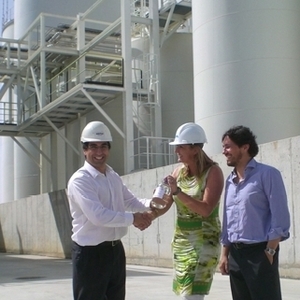Enerfuel's 7.5 MMgy biodiesel plant in Portugal begins operations

Photo: BDI-BioEnergy Int'l AG
July 19, 2013
BY Ron Kotrba
After years in the works, Enerfuel S.A.’s 25,000 ton (7.5 MMgy) multifeedstock biodiesel plant in Sines, Portugal, has officially begun production. Enerfuel first commissioned Austria-based BDI-BioEnergy International AG to carry out the overall planning, delivery and installation of the biodiesel facility in 2006, which cost about €10 million. After installation was completed, Enerfuel halted the project in 2008. In September 2012, BDI was commissioned by Enerfuel to restart and finalize the project, a job worth another €3 million to BDI. Enerfuel brought in Portuguese oil company GALP as a partner.
The plant was officially handed over in the company of senior representatives of the corporate customers and the Portuguese Minister of Economic Affairs, who emphasized the importance of this renewable energy project for Portugal in his speech at the inauguration ceremony.
The newly operational biodiesel refinery is using animal fats and used cooking oil as biodiesel feedstock.
Advertisement
Advertisement
“Following the positive conclusion of the performance test, we are delighted to hand the plant over to a satisfied customer, particularly in view of the fact that it is also the first multifeedstock biodiesel plant to come into operation in Portugal, albeit after some delay,” said Edgar Ahn, chief science officer and member of BDI’s management board. “The active involvement of the Portuguese mineral oil company GALP in this project is confirmation to us that well-known fuel manufacturers have confidence in the high quality of our unique biodiesel production technology.”
Advertisement
Advertisement
Related Stories
Marathon Petroleum Corp. on Aug. 5 released second quarter financial results, reporting improved EBITDA for its renewable diesel segment. The company primarily attributed the improvement to increased utilization and higher margins.
Chevron Corp. on Aug. 1 confirmed the company started production at the Geismar renewable diesel plant in Louisiana during the second quarter after completing work to expand plant capacity from 7,000 to 22,000 barrels per day.
The public comment period on the U.S. EPA’s proposed rule to set 2027 and 2027 RFS RVOs and revise RFS regulations closed Aug. 8. Biofuel groups have largely expressed support for the proposal but also outlined several ways to improve the rulemaking.
In celebration of World Biodiesel Day, MOL Group on Aug. 8 announced SAF was successfully produced for the first time at INA’s Rijeka Refinery during a pilot project to process biocomponent. Renewable diesel was also produced.
Iowa farmers have a new market opportunity for their 2025 soybean crop. Landus is expanding its Clean Fuel Regulation initiative, made possible by recent policy changes expected to increase Canada's demand for liquid biofuel.
Upcoming Events










